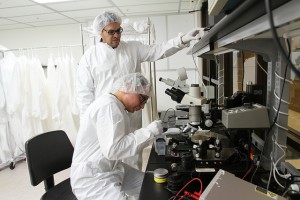 The University of Texas at El Paso’s Department of Electrical Engineering has received a $55,000 grant from the National Science Foundation through the University of California, Berkeley to develop materials that could be used to make computing more energy efficient.
The University of Texas at El Paso’s Department of Electrical Engineering has received a $55,000 grant from the National Science Foundation through the University of California, Berkeley to develop materials that could be used to make computing more energy efficient.
The grant funds a project titled “2-D Layered Materials for Enabling High-Performance Nanoelectronic and Nanophotonic Devices” and will enable UTEP to perform cutting-edge research on new two-dimensional materials that could replace traditional devices used for computing.
“This grant will enable us to train students, improve the research infrastructure, and build upon ongoing research on energy efficient electronic devices at UTEP,” said David Zubia, Ph.D., associate professor of electrical and computer engineering and the principal investigator of the project.
UTEP will work in collaboration with faculty from UC Berkeley, the Massachusetts Institute of Technology and Stanford University through the Center for Energy Efficient Electronics Science (E3S), which is funded by the National Science Foundation.
With the funds, the UTEP College of Engineering will be able to hire students to perform research on energy efficient devices in its new nanofabrication facility as part of E3S. In addition to creating new student research positions, the project will help improve the infrastructure at UTEP to perform research on 2-D materials and devices.
The anticipated end result of this research will be 2-D devices that are much more energy efficient than existing technology, allowing society to conserve the energy that is currently used by computers worldwide.